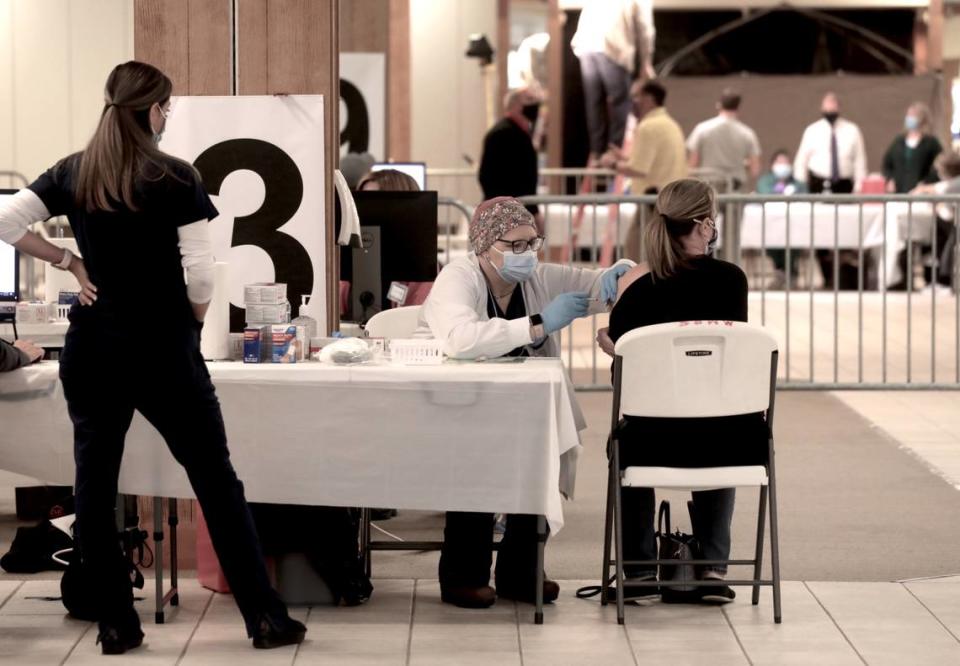Looking for COVID vaccines across the NC, SC state line? Here’s what you need to know
As COVID-19 vaccine eligibility continues to expand in North Carolina and South Carolina, some people have turned to crossing state lines to find access to a COVID-19 vaccine.
North Carolina updated its guidelines on vaccinating people from other states last month, allowing vaccine providers to turn away people who do not live, work or receive medical care in N.C.
But in practice, can North and South Carolinians still cross the border if needed to get a vaccine?
The short answer is yes — but local health officials largely encourage people to get vaccinated in their state of residence.
Unlike North Carolina, South Carolina health officials have not released any residence guidelines for people seeking vaccines.
“We know that we have soft borders between states and between counties. So we’re not looking to impose really strict residency requirements on people who can be vaccinated,” South Carolina state epidemiologist Dr. Linda Bell said during a media briefing Wednesday.
Who’s eligible for the vaccine?
Earlier this month, South Carolina expanded vaccine eligibility to an additional 2.7 million people in Phase 1b, which includes anyone 55 and older, people age 16 to 64 with preexisting conditions and front-line essential workers.
North Carolina is not yet offering vaccinates to everyone between the ages of 55 and 64, so it’s possible that some of those people near the state line would turn to South Carolina for a vaccine.
North Carolina is currently offering vaccines to people with chronic health conditions, health care workers, residents and staff at long-term care facilities, front-line essential workers, people living in shelters and prisons, and anyone age 65 and up.
Neither North Carolina nor South Carolina is requiring vaccine seekers to prove residency or eligibility for preexisting conditions.
“Our goal from the global public health perspective is to get as many people vaccinated as quickly as possible,” Bell said. “If (an out-of-state resident) found an opportunity to get an appointment, and they’re eligible, then we’re not working to be particularly discouraging.”

Not enforcing residency requirements
Even now that South Carolina has opened up eligibility to nearly 4 million residents — or roughly 78% of the state population — officials do not plan to enforce a residency requirement, Nick Davidson, SC Department of Health and Environmental Control’s senior deputy for public health, said.
Davidson said officials recognize that there’s a number of out-of-state residents who spend significant time in areas of South Carolina, like Rock Hill, that are close to neighboring states. Those people should be able to get vaccinated in the state, he said.
“This illness knows no borders,” Davidson said.
A small proportion of those vaccinated in South Carolina have been out-of-state residents, Davidson said. About 1.4% — or 21,394 — of the 1.5 million doses administered in South Carolina went to North Carolina residents, according to South Carolina’s dashboard.
North Carolina reports about 2.4% of COVID-19 first doses — 49,047 of the 2 million first doses administered in the state as of Thursday — go to out of state residents.
Vaccine availability
Mecklenburg County has seen a number of people from outside of Mecklenburg come to the Charlotte region for vaccines, county Health Director Gibbie Harris said Wednesday.
Those people may be drawn to the Charlotte area by availability of vaccines, especially at mass vaccination events, like the ones hosted by Atrium Health at the Bank of America Stadium, she said.
The percentage of Mecklenburg County residents vaccinated lags behind the state’s rate, likely due in part to that influx of non-residents getting vaccinated in Charlotte, Harris said.
Roughly 9.2% of the county’s residents have been fully vaccinated against COVID-19, according to NC DHHS numbers released Thursday. In comparison, nearly 12% of North Carolina residents have been fully vaccinated as of Thursday.
Crossing lines before COVID
But local health care providers say some South Carolinians were already going to Charlotte area doctors before the pandemic.
“Many of our patients do not reside in North Carolina, as we provide healthcare across communities in North and South Carolina, as well as Georgia,” Atrium Health said in a statement. “…By vaccinating someone from a neighboring state, we are still working towards the end goal of getting everyone in our community vaccinated against COVID-19 and to end this deadly pandemic.”
And North Carolina-based hospital system Novant Health emphasized that N.C. and S.C. residents are encouraged to get a vaccine in their respective states, but crossing the border may be necessary for some.
“It’s absolutely our intention to vaccinate only those who do work or live in North Carolina, or those who are Novant Health patients — but reside across our borders,” Novant spokeswoman Megan Rivers said in a statement. “The fact that we are such a large system with a footprint that spans states makes the residency issue more complex for us.
“…For instance, we have neighbors in rural areas close to the border and for some, our vaccination sites may be the closest or most accessible,” Rivers said. “We have to make sure we’re not denying access to those who do need it.”
